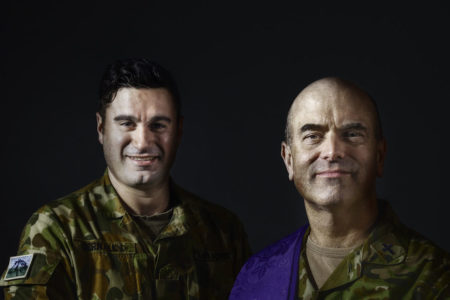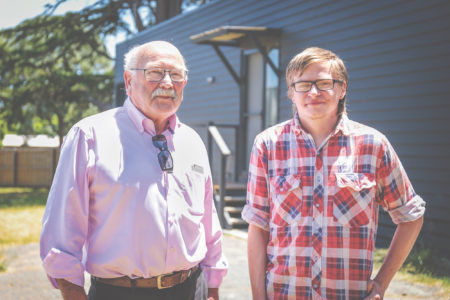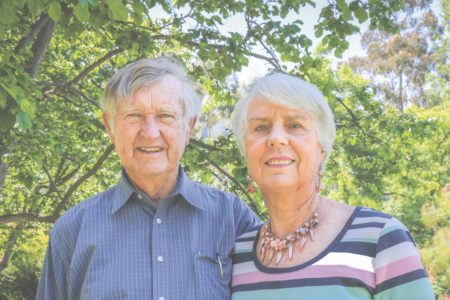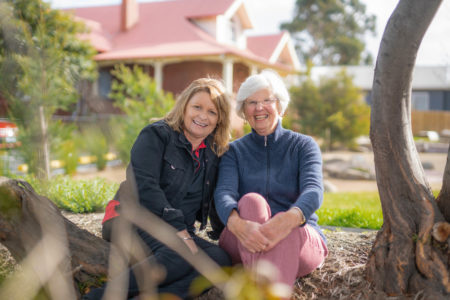Rev Dr Robyn Whitaker and Rev Fran Barber have been friends for 25 years. In that time they have shared a lot of things – including a wedding dress. They now share a podcast to help resource people in ministry.
Robyn
I am a preacher’s kid, as they say. My father was a Methodist minister in South Africa. I was born in Kimberley and raised in Cape Town.
My childhood memories are extremely happy. We lived in a lovely neighbourhood with cousins, family and community all around us. We’d go to the beach after school in the afternoon.
With the benefit of hindsight I can see what was a perfect childhood for me was not the case for the majority of South Africans under Apartheid. I lived in a white suburb with all the privileges that brought and had very little contact with any non-white South Africans.
As a child, I didn’t pick up any sense of the unrest, but my father was well aware of it. When I was a baby in Kimberley he was trying to get a group going where black and white Christians would do Bible studies together. Some of his black colleagues got death threats and letterbox bombs over that because it was seen as subversive.
My family went to live in the UK when I was nine and we migrated to Australia when I was 12. Dad is now a Uniting Church minister, so the UCA has become my home since being a teenager.
We would visit South Africa often over the years. I saw the changes, the dismantling of Apartheid. I remember going back when I was about 16 and it was the first year they had taken down signs from the beach saying “whites only”.
My extended family, with all due respect to them, went to some conservative white Christian churches that did not see that there was a tension between them talking about love and God’s forgiveness on Sundays and the fact they were actively racist in every other part of their life. The disconnect was pretty striking, particularly after I left the country and became aware that there were other ways of being Christian.
I think I saw Christianity as a potential vehicle for change and inclusivity, partly because the black church in South Africa was so vital. Through leaders like Bishop Desmond Tutu, Christianity became a source of hope for change and liberation.
In Australia, I got very involved as a teenager with some evangelical church groups and that kept me engaged, finding pockets of younger people who were very enthusiastic about faith.
When I was doing a science degree at Monash University, I wasn’t sure what to do with my life. I had this sense of God telling me to become a minister, which is not what I really wanted to hear because when you grow up as a minister’s kid you know that ministry is not glamorous. So I started looking around for where to study theology. I didn’t know much about the Uniting Church’s theological college in Melbourne but I candidated and enrolled in a Bachelor of Divinity at what was then the United Faculty of Theology in 1995.
Fran began studying her BachIor of Divinity that same year. My first impression of Fran was of someone who was super smart and bookish and intimidating in a “she’s got her act together kind of way”. She was well prepared and was always well read. Fran had this arts and humanities background, whereas I had this science degree, so I felt very out of my depth for the first few years because I felt like I was playing catch-up.
We had a mutual friend, Judith Watkins, who was also training to be a candidate and is now a minister. It turned out Fran was looking for somewhere to live, I was looking for somewhere to live and Judith was the person who arranged a lodging for all of us. Fran and I didn’t really get to know each other before moving in together, but we had friends who said “you two are going to get along”.
We lived in a manse that wasn’t being used by the minister. Fran was very thoughtful, an ideal housemate. She always had healthy food around, didn’t have annoying habits and didn’t play loud music. We got along well, but we also had our own lives, which I think is important.
After a year, Judith moved out and Fran and I moved to a student two-bedroom sharehouse.
We didn’t sit around discussing theology, but we would discuss the stuff that impacted us, like thinking about ministry. I remember us both bemoaning when we were single that we’d never get married, there were a lot of stats around female ministers staying single – not a lot of guys necessarily want to marry a female minister.
When I started formally studying theology I came in with some pretty simplistic and black-and-white ideas about the world, the Bible and how God functioned. Even when I got called to ministry I wasn’t sure that women should be in ministry and whether the Bible was on board with that.
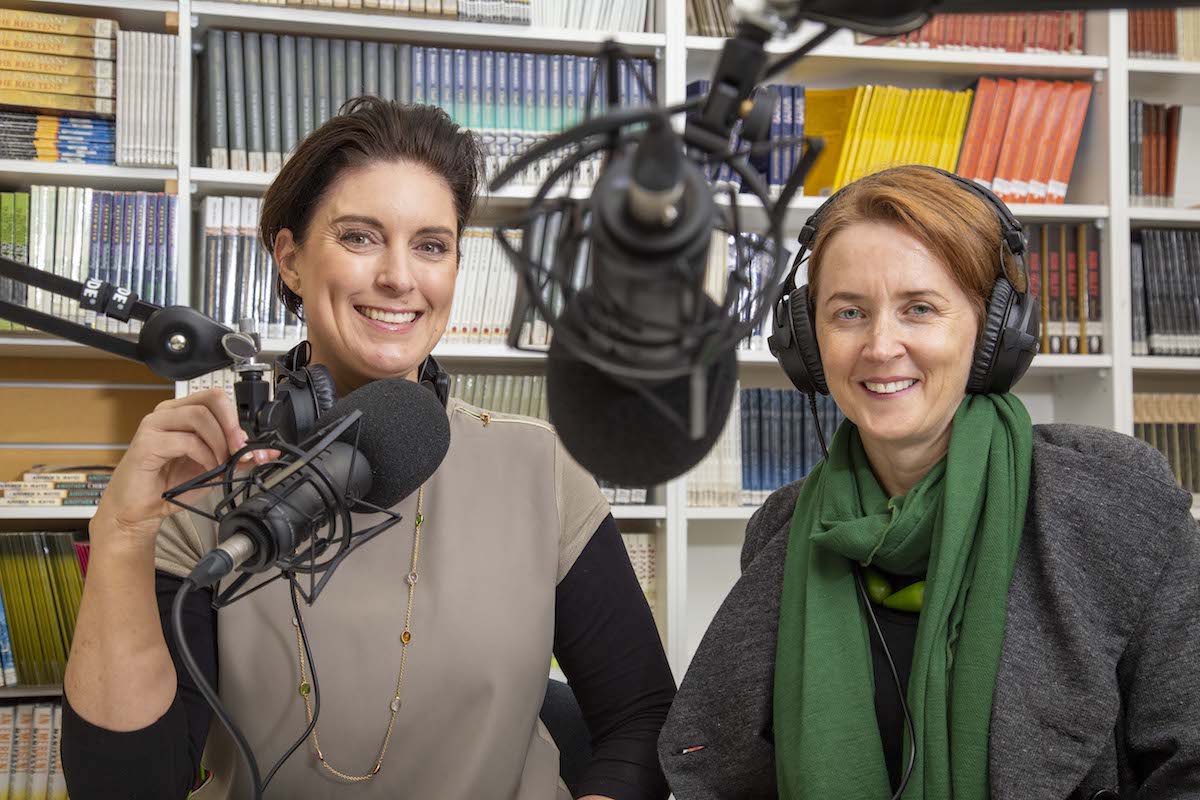
Rev Dr Robyn Whitaker (left) and Rev Fran Barber (right). Image by Carl Rainer.
I remember near the end of my first year leaving a New Testament class where we had learnt some of the historical problems that mean we can’t take some of these stories as historically accurate. I remember thinking “I don’t know if I can believe any of this”. I went through this little faith crisis as a candidate thinking “maybe I am actually Jewish. I know there is a God, but I am not too sure about this Jesus person”.
So, there were times studying theology that were quite discombobulating as I had to rethink some things. My background helps me appreciate that there can be genuinely well-meaning people who can be deeply conservative and don’t realise the harm they are doing with some of those stances, particularly around gender and sexuality.
Christians are way more hung up on sex now than we were even 400 years ago. A lot of these are puritan values that have really emerged in the last couple of hundred years. I think it’s about patriarchy, male power and a reluctance to notice the Gospel is a lot more judgemental about love of money than any sexual immorality. That’s quite a hard thing for people to cope with.
I would say I am orthodox with a little “o”. You might call it generous orthodoxy or inclusive orthodoxy. Part of believing in God’s grace for all people is that it is for all people, regardless of gender and sexuality. Not in the limited sense of “yes, you’re a women, we will allow you to come into church but we won’t let you use your gifts in this way” but grace in the fullest sense.
Part of what drives me to write for a wider audience is to bring some of the stuff that you learn in a theology degree to a greater number of people. If you remain with a conservative viewpoint, fine, but it shouldn’t be because you haven’t heard there are other ways of thinking about something.
I stopped living with Fran when I got married and then was ordained around age 24. My first parish placement was in Wangaratta for four years before I went back to Melbourne to do a Master’s degree. I also backfilled for Fran’s maternity leave when she was a chaplain at Methodist Ladies’ College, so we do follow each other around.
After a few degrees in Melbourne, at what I think is the best theological place to study in Australia, I felt like I needed to be exposed to some different things. It was also a chance to have a bit of an adventure and live overseas with my husband Peter French, who is an Anglican priest.
I went to America and did a PhD at the University of Chicago and taught at various theological colleges. We moved to New York when I got a job at Union Theological College.
After about a decade in the US, we came back to Australia in 2016. I had a lecturing job at Trinity College when I was asked to apply for the New Testament position that opened up here at Pilgrim.
Fran had been asked separately to apply for her position and she started at the Centre for Theology and Ministry on the same day as I did.
It’s always been an easy friendship. Even if we haven’t spoken for months in various stages of our lives, we slot back in. We’ve known each other for more than half our lives. We’ve got these shared experiences, we’ve got memories together.
Shortly after I started at Pilgrim, the Head of College, Sean Winter, said to me “we’ve got a bunch of biblical scholars around so we could have a podcast to resource preachers, is that something you want to run with?”
Only in recent years have I been a podcast listener. I remember when everyone used to rave about them and I thought “what are these things?”. But when I came back to Melbourne I quickly realised I got very bored on a 45-minute commute if I didn’t have something stimulating. I now have a rotation of about 10 different podcasts. For me a podcast is a really good way to get a lot of information in a short amount of time.
As I considered the podcast idea I thought “I need the right person to do it with”. Then I thought of Fran and that she does the continuining education for ministry. I thought it would be nice to do with a friend, but also a colleague I respect and who has a similar vision about what we would do.
We did a bit of research. What we found is there is no Australian podcast on the standard lectionary preachers use and we couldn’t find one anywhere in the world led by women.
The first By The Well last November was recorded on the floor of my office and we didn’t have the whiz-bang equipment we do now. We were just using laptops and little mic things. That one ended up in the bin. Our delivery was stilted so we re-did it. We are more relaxed now.
We aim to give listeners some different ways to look at Bible reading or to think about interpreting or preaching a text. I didn’t do parish or congregational ministry for that long but I know it is hard to keep being creative. Our hope is that if we can give people new material to think about it is helpful for them.
I am also conscious, as someone who started ministry in a rural setting, that you are often limited by the books on your shelves. In my first placement, if I didn’t have a commentary on a book I felt like I couldn’t preach on it. So, some of the podcast idea is about wanting to resource people in remote ministries who are very time poor and are not going to be able to get to a library to search the internet to find an article.
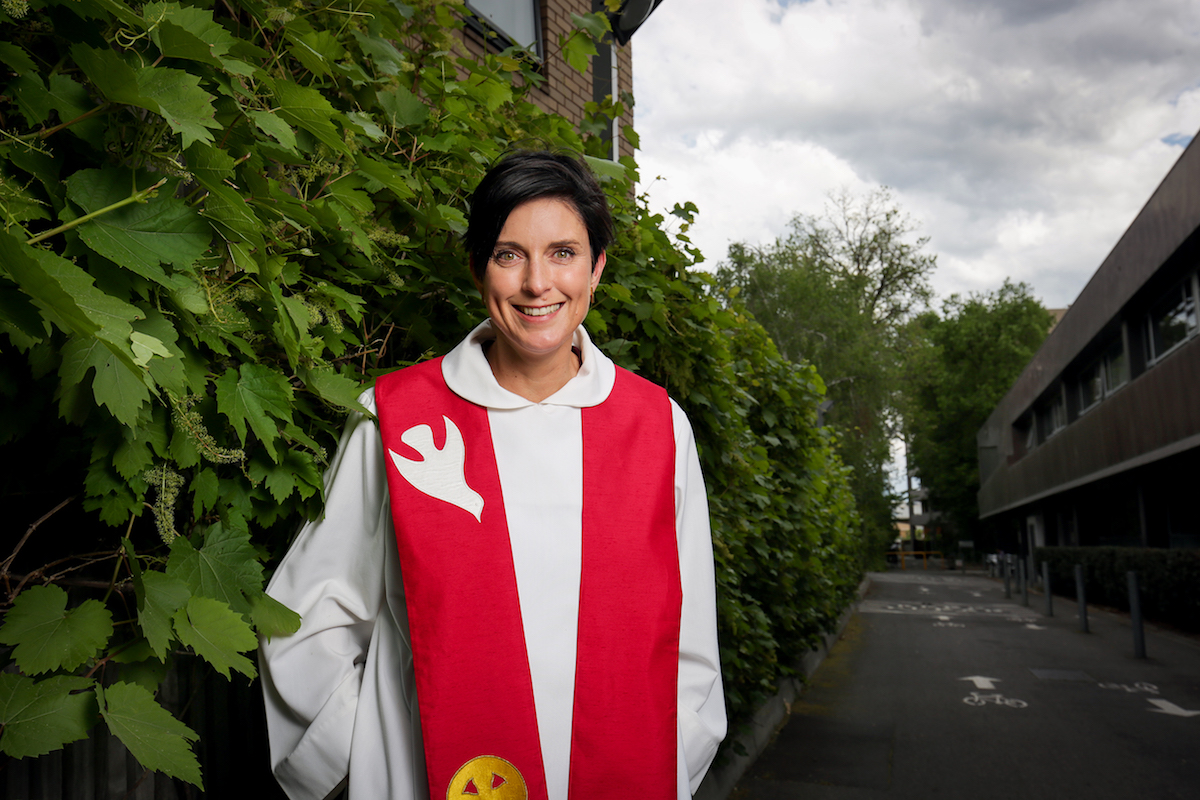
Working as a scholar you also are constantly learning new things and you are on that edge of what interesting new scholarship is coming out. I am conscious that often doesn’t trickle back to the pews, or it takes decades. So, when I have read an interesting article that is perhaps a new perspective for me, that’s the kind of thing I share in the podcast.
We also have guests. We aren’t totally reliant on guests, but there are fabulous scholars and practitioners we have spoken with. We have even Zoomed a few from the UK.
The podcast takes about half a day of preparation and editing each week. At the moment we are getting about 400 listeners. We started with about 200. As of last week we had a 4.7 rating (out of five) on iTunes. People have been nice to us. We’re hearing comments like “I listen to this every week now, it is part of my preparation”. People who are not ministers have also talked about using it as their devotional discipline.
As a biblical scholar I often ask “what does this word mean?” or “what is the history behind this thing in the text?” Fran often asks the theological question. That is where we complement each other. I can go into the nitty gritty of the history behind the text. Fran will tend naturally to the theological question of “what does this say about God?” or “what is the impact of the big picture question?”. Some of the feedback we have from ministers is they like the way we bring it out again to what is the bigger picture.
One of the podcasts Fran and I really like is Chat 10 Looks 3 with Leigh Sales and Annabel Crabb. They just talk about books and movies, but it does feel like you are overhearing a conversation between good friends. Even though ours has a very pragmatic preaching focus we try to capture a bit of that. It is a conversation not a mini-lecture.
Apart from the intro and outro, By The Well is not scripted so it is a conversation. We discuss ideas beforehand and probably spend an hour in the recording room for every episode.
I think Fran and I have some similarities in being task-focused. There is also the depth of relationship, neither of us is trying to outsmart the other, there is a genuine trust there.
Fran
I actually wore Robyn’s wedding dress when I got married. I found the whole bridal thing extremely uncomfortable. I thought “Robyn’s is very simple and elegant, I’ll just see what she is doing with it”. She said “well, mine’s in the closet, do you want it?” I said “sure”, so mum altered it for me.
Like Robyn, I am a preacher’s kid, fourth generation apparently.
I was born in Perth, but came to Melbourne very young. I grew up in North Melbourne. It was a great place to grow up in terms of socio-economic, cultural and political diversity.
Obviously I grew up in a Christian home. It was an environment with thoughtful, perplexing and sometimes energetic theological conversations.
As far as my Christian faith goes, I never really rebelled, but in the part of Melbourne I lived there wasn’t a lot of youth activities in the Uniting Chruch, so I did spend a couple of years as a teenager where I did just give up on church.
But it was at university I encountered, just by chance, four really great people. We were all Christian and seeking and we encountered the Student Christian Movement, which was still alive and kicking at Melbourne Uni. And that became a really important community for me because it was a place to learn, to question and to grow, and to establish some great friendships, which endure today.
In terms of my Christian theological formation, I was hearing a lot of what I thought was rubbish on campus – for instance, Christian groups who didn’t allow women to be in leadership positions, which to me is ridiculous.
When I finished my arts history degree, I went to Europe and travelled around and worked in Germany, and in England (for the United Reformed Church). While away, I experienced not a call to ministry but a call to study theology – that’s how I would describe it. I needed to go find out more about the faith – this is where life is at, this is life and death stuff.
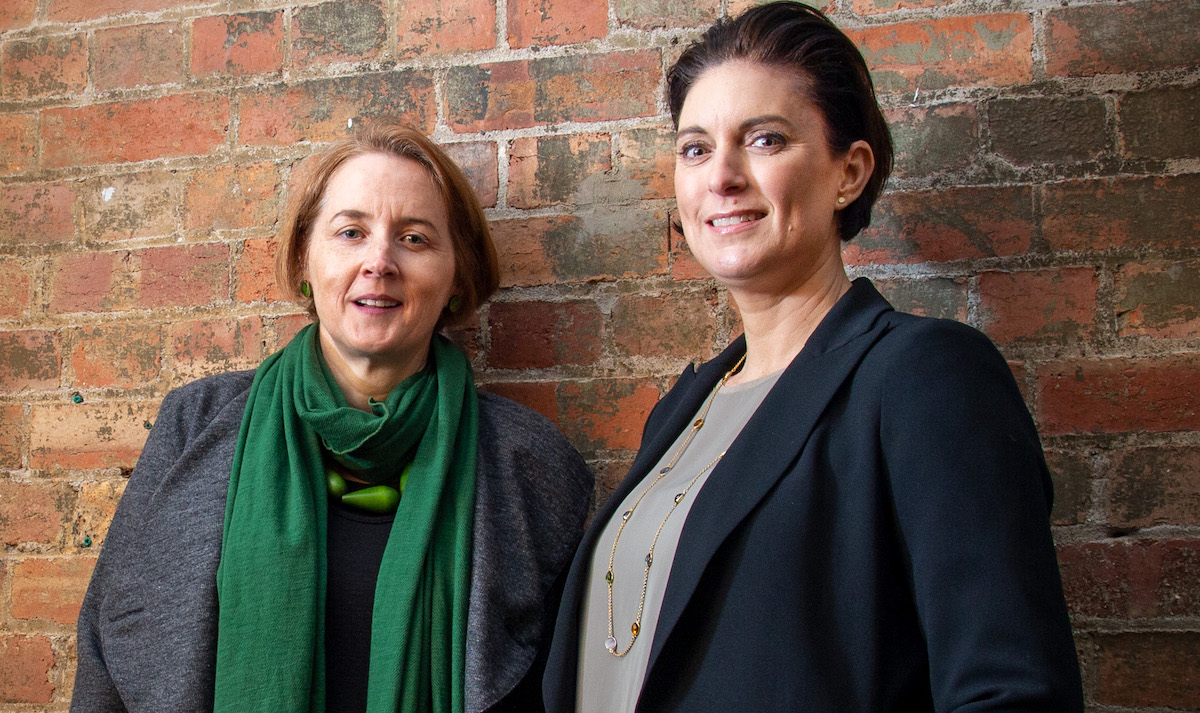 I enrolled as a private student at the United Faculty of Theology where my dad was dean. It was fine being taught by my dad. He’s a really interesting, inspiring teacher. However, I kept my surname to myself the vast majority of the time and that was good.
I enrolled as a private student at the United Faculty of Theology where my dad was dean. It was fine being taught by my dad. He’s a really interesting, inspiring teacher. However, I kept my surname to myself the vast majority of the time and that was good.
I was a bit intimidated by Robyn. She was smart and seemed sure of things, but I got to know her during that first year when we lived in what we called our sorority house, the manse with Judith.
I found studying theology really exciting. It was just really fantastic stuff to learn. There was also a sense of outrage from time to time that we weren’t taught this stuff already in the churches.
I applied for the ecumenical scholarship through the World Council of Churches, and the University of Geneva. I studied theology there with people from all over the world and that was an amazing experience. It was during that time I realised ministry was an avenue I needed to explore. I couldn’t not do it, was how I put it.
I do think there is a gender dynamic here in terms of my family history of ministers, that if I was a bloke it would have been harder to feel like I had my own identity. I don’t have to prove to be terribly different because obviously I am.
Back in Australia, I enrolled in a diploma of education. I wanted something that would enhance ministry practice but I was also thinking I don’t know if the church is being able to call me for all my vocational life. I need to have some other way of making a living, which might sound pessimistic, but at that stage there were more ministers than positions.
It’s quite lonely as a Gen Xer in the church. A lot of people who trained with Robyn and I have pulled out, and our peers are not in the pews. When you are a younger minister leading a congregation you are often the only person of that age bracket and that can be a bit strange.
Near the end of my candidature, I was approached by one of the chaplains at Methodist Ladies’ College, to fill a teaching gap for a term. Rather audaciously, I just said “I’ll give that a go”.
It was a great experience and essentially I got called to chaplaincy there. I feel very honoured and blessed to have had that first placement for five years.
I also met my husband, David Hall, who at the time was working for Frontier Services. I’d asked him to come speak with the year 12s. When we had our first child I knew it would have been difficult to effectively minister as a chaplain part-time in that role with the way I wanted to parent.
As it turns out, I had three children in four years. I was able to serve the church in supply ministry for three-to-nine-month periods in different places and learnt a lot from doing that.
I was called to ministry at North Essendon UC in 2011. I was a minister there for six-and-a-half years. It is a really lovely community who appreciated the ministry that I could offer. I did a small role with Synod for nine months and then I was called to be Continuing Education Coordinator at eLM.
There were times when I didn’t have much contact with Robyn as we had different lives. I feel like the friendship is really strong because it seems to have a dynamic that when we’ve had gaps where we haven’t seen each other or communicated regularly it just feels natural to reconnect.
Robyn and I feel very passionate about preaching. It’s a difficult task, it’s a really peculiar thing to be engaging with in the 21st Century, but transformative for the preacher and the hearer when it’s done faithfully and well. Compared to places like America, where they talk a lot more readily about preaching we really don’t as a church.
There are places in the Synod where churches rely significantly on lay leadership, and we hope By The Well is an accessible resource in those situations. It has a ministry practice focus as well as the scholarship one, though the division there is an artificial one.
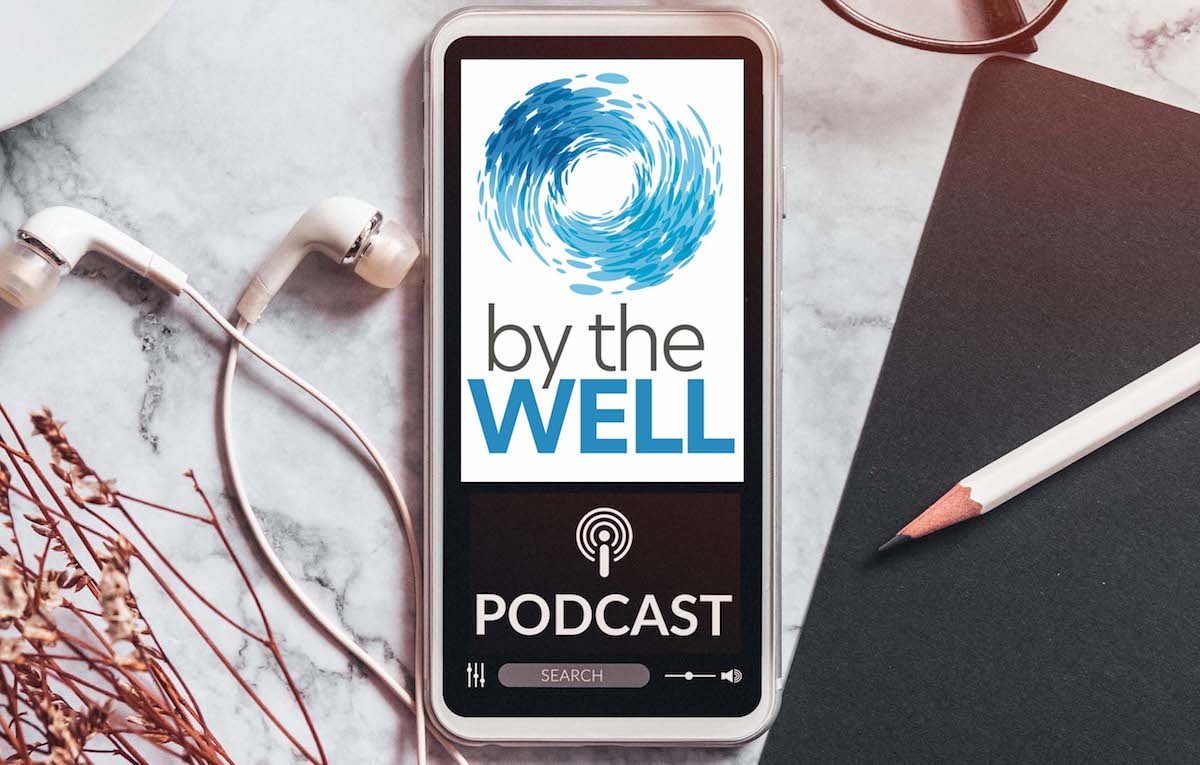 I think early on we thought “let’s not mention too much of outside world events, so in three years we might be able to re-release some of these episodes”. Then after our summer break the bushfire awfulness happened, so the whole idea that you wouldn’t be too specific just went out the window.
I think early on we thought “let’s not mention too much of outside world events, so in three years we might be able to re-release some of these episodes”. Then after our summer break the bushfire awfulness happened, so the whole idea that you wouldn’t be too specific just went out the window.
I think the COVID period has challenged us to think about ways of communicating. We understand that people are preaching in really strained circumstances; the situation brings “the main things” into sharp relief. Those main things being: relating and connecting, so this context has meant our conversation has got quite specific. You don’t preach into a vacuum, you preach into a context. So if the Bible says anything to those contexts we can’t ignore that.
It’s a balancing act though, we don’t want to necessarily say “On Tuesday, Trump did this” because we are recording generally two to thee weeks ahead. However, when something at a national or international level happens it would seem tone deaf not to incorporate it. It would just be ridiculous to talk about interpreting the Bible or preaching the Good News, and not talk about a worldwide pandemic or Black Lives Matter questions.
I think there are similarities in how Robyn and I operate, which is why podcasting together works. Neither of us is particularly waffly; we are here to do a job, and we get on with it. With Robyn, I appreciate that she has smart strategies for doing things. She is easy to talk to. I can float an idea with her that on the face of it might be fairly average but it starts to develop, or not, if she says that it is “an average idea” (which she doesn’t).
When you are starting out something like the By The Well podcast, as women you can’t be too flippant. We are very serious about providing solid content, but I think we have a light touch. We don’t have argy bargy, but we don’t always think the same way.
To listen to the podcast visit bythewell.com.au or find it on iTunes, Spotify or Google Podcasts.
LISTEN UP
Five great podcasts, as recommended by Robyn:
- God Forbid (ABC). An Australian ABC radio show hosted by James Carleton that covers a range of issues related to religion.
- Seeing White. An American podcast out of Duke University tracing the history of whiteness and issues of race.
- The Minefield (ABC). Scott Stephens and Waleed Aly discuss current issues in light of morality, values and philosophy.
- Chat 10 Looks 3. Anabel Crabbe and Leigh Sales discuss books, movies, the arts, and baking in a light-hearted and fun way.
- The Bible for Normal People (Pete Enns). Two biblical scholars talk about the Bible in ways that are accessible and relatable.
You can find the By The Well podcast on Google Podcasts, Spotify, Apple Podcasts and the By The Well website.


